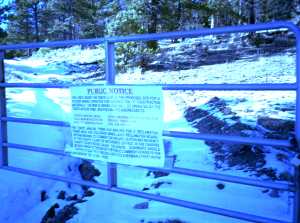Brief by Central Staff
Water Law – May 2002 – Colorado Central Magazine
If someone stores and removes water from an aquifer under your property, is that trespassing? Not according to the Colorado Supreme Court, which issued a ruling on a Park County case on April 8.
It’s the latest twist in a long legal saga. Briefly, it started with a plan by the City of Aurora to acquire water in South Park during wet years. Rather than store it in the usual above-ground reservoir, the water would be pumped down into an aquifer that spread across 115 square miles, and water would be removed in dry years.
In Park County, this “Conjunctive Use Plan” was about as popular as anthrax. The county government, among other entities, opposed the proposal in the water court for Division 1 (the South Platte basin — the court is based in Greeley, but conducted many of these hearings in Fairplay).
They opposed the plan on two grounds — that the aquifer recharge and extraction plan would damage existing water rights, and that the storage would extend under other people’s property, thereby constituting a trespass.
On June 1, 2001, the water court agreed that the project could damage existing surface rights and lead to stream depletions. So the court dismissed the application for conditional water rights for the aquifer project.
That has been appealed, of course, and there was also the trespassing question. The water court said that it wasn’t trespass; that was appealed, and the state Supreme Court agreed in its ruling.
For one thing, the court observed that the project did not involve any construction on other people’s property, and thus did not impair their rights to use and enjoy their property. For another, under Colorado law, a landowner whose property includes a flowing stream can’t stop someone else from using the stream to transport water for beneficial use, and by analogy, the same should be true of underground water.
So, even if you own the land, other people can store water beneath your property without your consent. This might have implications for other water trespass issues, such as rafters who float over private property — but that will likely have to wait until someone on one side or the other wants to start some expensive litigation.

